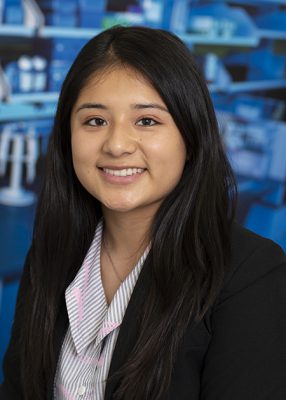
By Ashlee Larrison
GCU News Bureau
Esmeralda Gomez always knew she wanted to help people.
Then a bio technology class in her junior year of high school introduced her to biomedical engineering and sparked her interest in becoming a physician assistant.
“I got to do a lot of stuff with DNA, electrophoresis, PCR (Polymerase Chain Reaction), stuff you wouldn’t normally do until college,” Gomez said. “That really opened up my mind into what science could do, and I wanted to learn a lot more about it.”

Now, starting her sophomore year as a College of Science, Engineering and Technology and Honors College student at Grand Canyon University, Gomez is returning to campus after completing a paid eight-week summer internship with TGen, a Phoenix nonprofit that focuses on developing earlier diagnostics and treatments.
During Gomez's scholarship interview shortly after arriving at GCU, Associate Dean Breanna Naegeli asked her what she wants to do during her time on campus. When Gomez expressed her interest in biomedical engineering and biotechnology, Naegeli told her to apply to TGen's prestigious Helios Scholars program, for which other GCU students previously had qualified.
She wasn't chosen the first time she applied but tried again and was one of about 45 students selected to work under the mentorship of a TGen scientist and try to unravel the genetic components of diabetes, neurological disease and cancer.
Gomez, along with interns, current or former Arizona students from around the country, worked in various labs. In a drug development lab she studied SCCOHT (small cell carcinoma of the ovarian hypercalcemic type), a rare form of ovarian cancer characterized by the absence of SMARCA4, a protein within the gene, and possible treatments for it.
“It was really exciting,” Gomez said. “I got to work with Whole Exome CRISPR. CRISPR can be seen as genetic scissors that can be programmed to cut out or insert different genes using sgRNAs (Single Guide RNAs). The goal was to find a gene that led to synthetic lethality in combination with the absence of SMARCA4”
Using CRISPR, she saw how the addition or subtraction of certain genes affects the disease.
Gomez said TGen tried to make each of their interns feel valuable no matter what college they attend, Ivy League or otherwise. She often worked separately from the other interns although there were a few occasions where they all interacted.
“Something that they always told us was to not see each other as competition because each person in that room was qualified to be there,” Gomez said. “When we did have time to meet (the interns), we’d talk about all these projects each of us were working on and sometimes we would share problems that we ran into and how another group solved it. It was just really cool. There was just never any competition between us -- it was all about growth.”
Gomez hopes to use her TGen experience as a catapult to more internships down the road. Although she hasn’t decided whether she’d want to go to medical school or another form of graduate school once she receives her bachelor's, she does know one thing for sure.
“Research is definitely where I think I want to be,” she said.
Contact Ashlee Larrison at (602) 639-8488 or [email protected]
****
Related content:
GCU Today: Honors College senior wins award during internship



































































